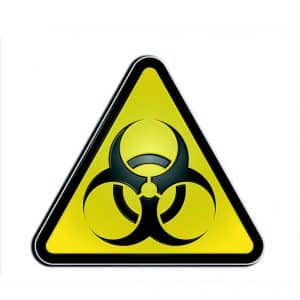This post was co-authored by Evan Janssen, a student at St. Mary’s School of Law, and Ryan Reiffert, San Antonio corporate & transactional attorney.
In case you’ve been living under a rock, COVID-19 has dominated current events throughout 2020. For the science sticklers among you, a brief detour:
- COVID-19 is the name of the disease or set of symptoms (very creatively named for “corona virus disease of 2019”)
- SARS-CoV-2 is the virus that causes the COVID-19 disease (the SARS-CoV-2 designation denotes that the new virus is genetically closely-related to the coronavirus responsible for the SARS outbreak of 2003; as with many movies, the sequel is worse)
- The term coronavirus describes a type of virus. Most are not so bad (this one is bad).
From city wide shutdowns to school, and business lockdowns, mask mandates, government stimulus, more stimulus, and much more, COVID-19 is something that the world simply was not ready for. This includes the legal world in many cases.
But it is not just daily life that has been impacted drastically. Businesses across the world have been scrambling to check their contracts for the existence of a Force Majeure clause. We talked about this briefly before but we will go into a little more detail here. The existence, and exact language, of this clause could be the difference for countless contracts in determining whether, and how, a party will be required to uphold their obligation to the contract. Oftentimes, Force Majeure clauses are included by transactional attorneys as an afterthought to a contract, and their terms are not closely examined because the events seemed to be such a remote likelihood (“in case of war, riot, famine, or epidemic, this contract shall…” “yeah right, like any of THAT is actually going to happen”) – but, in this case, the likelihood may have been higher than we thought, and it did actually happen.
If you want a quick recap on other potential implications of Force Majeure and covid-19, check out this article from March. https://ryanreiffert.com/blog/covid-19-force-majeure/
A Force Majeure is defined as an unforeseeable circumstance that prevents someone from fulfilling a contract (sometimes called an “Act of God”). The Force Majeure clause governs what is to happen in such a circumstance, therefore the precise effect of such a clause is a case by case question highly dependent upon the particular contractual language. Virtually all Force Majeure clauses contain- within the definition of the term- a list of events that the parties agree are qualifying events.
Typical examples include riots, weather events (such as hurricanes or earthquakes), war, labor strike, and epidemics. Some have more terms, other terms, less terms, etc. COVID-19 is, of course, by any measure a global epidemic. Hence (obviously) if the term “pandemic”, “epidemic”, “viral outbreak”, “disease”, or another similar term appears explicitly in the Force Majeure clause, you have a slam dunk case that obviously triggers the clause.
But, what if the Force Majeure clause is drafted more vaguely? – for example, if the contract states “the parties are excused from performance if there is a Force Majeure or Act of God” without any definition or clarification of those terms?
As mentioned above, a Force Majeure typically refers to an event seen as an “Act of God” beyond the reasonable control of the parties. Black’s Law Dictionary defines an “Act of God” as “an act occasioned exclusively by violence of nature without the interference of human agency.”
Similarly, under Texas law, an “Act of God” must not be caused or contributed to by human intervention.
The Texas Pattern Jury Charge is widely accepted by attorneys and judges as the most authoritative guide for drafting questions, instructions, and definitions in a broad variety of cases. The exact language used by the Texas Pattern Jury Charge on the instruction for an “Act of God” defense says it must be “caused directly and exclusively by the violence of nature, without human intervention or cause, and could not have been prevented by reasonable foresight or care.”
So where does that leave us with the present situation of Covid-19?
In typical lawyer fashion, it depends.
The interesting part of what we’ve quoted above is the “exclusively by… nature” or “not… cause or contributed to by human intervention” bit. Does this mean that if human hands in some way caused or exacerbated the instant pandemic, that it is not a Force Majeure?
Here’s how that might look…
SARS-CoV-2 first emerged in Wuhan, China (Chinese officials have off-and-on claimed that the disease was introduced by foreigners). Let’s look at a couple of different scenarios.
 Scenario #1: COVID-19 arose organically from one of China’s infamous wet markets
Covid-19 was initially believed to be a disease born in a Wuhan wet market. Wet markets are those markets that sell live wild and domestic animals and animal meat, often under cramped and unsanitary conditions that are highly conducive to the spread of disease (it is the accepted scientific consensus that SARS (original SARS) and MERS emerged this way, in wet markets of other Chinese cities).
Under such a narrative, existence of the virus in the wild and its accidental transmission to humans, sure, would be an Act of God.
But, is the bringing together of hundreds of different wild animals from around the world under cramped and artificial conditions, from bats to ferrets, chickens to civet cats, , pigs to pangolins, bullfrogs to scorpions, perhaps enough of a “human intervention” to defeat a claim of Force Majeure?
Maybe. But we’re not done. Let’s thicken the plot a bit more.
Scenario #1: COVID-19 arose organically from one of China’s infamous wet markets
Covid-19 was initially believed to be a disease born in a Wuhan wet market. Wet markets are those markets that sell live wild and domestic animals and animal meat, often under cramped and unsanitary conditions that are highly conducive to the spread of disease (it is the accepted scientific consensus that SARS (original SARS) and MERS emerged this way, in wet markets of other Chinese cities).
Under such a narrative, existence of the virus in the wild and its accidental transmission to humans, sure, would be an Act of God.
But, is the bringing together of hundreds of different wild animals from around the world under cramped and artificial conditions, from bats to ferrets, chickens to civet cats, , pigs to pangolins, bullfrogs to scorpions, perhaps enough of a “human intervention” to defeat a claim of Force Majeure?
Maybe. But we’re not done. Let’s thicken the plot a bit more.

Scenario #2: COVID-19 is an escaped experimental bioweapon/pathogen
Wuhan is the site of China’s equivalent of the American Centers for Disease Control – the high-security lab that deals with all the REALLY nasty diseases.
Brett Weinstein, a renowned American Biologist, recently appeared in an interview with Joe Rogan, the host of one of the top podcast in the world, where he spoke on what he believed to be the true origin of the disease, a theory that has gained great momentum in the last several weeks.
“The virus itself has several components that suggest it was actually the result of manipulation in a lab,” Weinstein said. “It may have well escaped.” There is tons of circumstantial evidence pointing towards a lab leak, Weinstein says, and he believes that no virologist is able to make a solid argument about how it may have evolved naturally.
Before you shout “conspiracy theory”, consider that (1) some very smart people believe this is plausible, (2) the following analysis could be the case for ANY escaped pathogen, and (3) many countries around the world operate virology labs just like this.
So, stipulate for a moment that Weinstein and others are correct. If it was created in a lab, this is very clearly a human intervention and cause; significantly moreso than something like “bringing weird animals together in a wet market”. Further, such a release would likely have been prevented by reasonable foresight or care. Either of these ideas would strike down an “Act of God” claim in Texas.
 Scenario #3: Whatever the origin of the virus, China’s suppression of information caused the disease to grow beyond the possibility of control
Scenario #3: Whatever the origin of the virus, China’s suppression of information caused the disease to grow beyond the possibility of control
Whether the virus itself came from a lab, a wet market, or anywhere else, it is undeniable China still had a large hand in the spread of the disease such as suppressing information and lying to the world about the diseases existence, nature, contagiousness, lethality, etc. for months.
While less conspiratorially-damning than havoc wrought by an artificially constructed virus, it is nonetheless possible that this would defeat an “Act of God” claim as the interference by the Chinese government is clear human intervention that prevented the disease from spreading naturally.
To state it another way, if a building burns down due to a fire, but the building was equipped with a defective sprinkler system that should have stopped the fire, but failed to do so, is this an Act of God?
Now, let’s ask another related question related to the role of “human hands” in this crisis: what if China’s malfeasance is being overstated? Or, what if it wouldn’t have mattered anyway?
Actions taken by the governments and individuals across the world likely accelerated the spread of the disease – that much is indisputable – but, from what we know about the contagiousness of this particular virus (in virology parlance, its basic reproduction number, or R0), the spread may have been truly inevitable regardless. Stated another way, if a police state like China couldn’t stop the virus with the draconian lockdowns and other measures that we saw it take, then the rest of the world didn’t stand a chance of stopping it. So, this is a situation where those looking to beat an “Act of God” claim would focus on the human intervention aspect again. Even if the disease could have spread without it, it is likely that things would not have gotten as severe or dangerous without humans speeding up the spread.
To wrap up, let’s leave the land of mere hypotheticals and venture into some real cases and case law.
Stay at home orders and curfews have directly affected many businesses’ abilities to perform as many businesses are unable to operate remotely (or can only partially operate remotely). Governmental orders requiring certain closures and supply chain variations are most properly classified as human elements. So, any delay or failure in performance resulting therefrom might even go to the “governmental act” language present in many Force Majeure clauses, as an independent basis to above-discussed the disease/virus clause.
For example, in Pacific Collective, LLC v. Exxonmobil Oil Corp., [currently being heard in the US District Court for the Central District of California. Buyer Pacific Collective (“PC”) notified Exxonmobil (“Exxon”) of its intent to redevelop property immediately after closing. PC argues that the government orders in response to Covid-19 rendered it impossible to physically attend a closing (which necessitates an in-person gathering, unless the acquisition agreement provides for remote closing) and to redevelop the property in the manner both parties knew was a core assumption of the real-estate agreement. This is a clever dual-use of force majeure, and businessmen/businesswomen would do well to pay attention to how the court rules in this case.
A much more clear-cut case, In re Hitz Restaurant Group, shows why clear language in a Force Majeure clause can be a “make or break” for your business and your deal. The Hitz case is a bankruptcy case in the United States Bankruptcy Court Northern District of Illinois, Eastern Division.
The restaurant group, debtor in the case, argued its obligation to pay rent was excused due to the Force Majeure clause in the lease. The creditors (unsurprisingly) disagreed.
The Force Majeure clause in the lease stated that “Landlord and Tenant shall each be excused from performing its obligations or undertakings provided in this Lease… [if] its obligations are prevented or delayed, retarded or hindered by… laws, governmental action or inaction, orders of government…”
The restaurant group argued the clause came in to effect when, in response to COVID-19, the Illinois governor issued an executive order restricting all restaurants to take-out only.
The judge in Hitz held that the Force Majeure clause was “unambiguously triggered” by the governor’s executive order. The decision stands as persuasive authority that Covid-19 closure orders qualify as “governmental action” to excuse contractual obligations under Force Majeure.
Bottom line: relying on an “Act of God” in your Force Majeure clause to get you out of a contract can work, but looks to be a complicated.
If a party cannot rely on a Force Majeure they still may be able to rely on the defense of or “impossibility of performance” or “frustration of purpose”. These are common-law contract defenses that typically only apply in extreme scenarios.
To evaluate impossibility of performance courts apply an objective assessment on whether the performance sought to be excused is impossible or impracticable, a party’s subjective capacity is irrelevant. Jurisdictions differ greatly in these assessments as some excuse performance only where it is truly impossible and others excuse performance when it is merely impractical.
In looking at frustration of purpose the focus is on whether the event at issue has removed the purpose of the contract as opposed to whether it has made a party’s contractual performance infeasible.
Now this next part may shock you.
Winning an impossibility/impracticability defense likely will vary state by the state.
Crazy, right?
But, since we are in Texas, here is one Texas case that might help you evaluate things. For other states, I recommend that you do your homework before going down this path.
In Tractebel Energy Marketing v. E.I. Du Pont De Nemours, there was dispute over a potential breach of contract between a power plant builder and the seller of emission reduction credits. Tractebel Energy Marketing v. E.I. Du Pont De Nemours, 118 S.W.3d 60 (2003).
TPI (through Tractebel Energy as its agent) contracted with DuPont to buy 1,000 tons of credits for $1 million. Du Pont was unable to produce the number or credits to TPI as a government regulation provided the ability for the credits to be cut in half by passing of future regulations. After Du Pont had their credits cut in half, the New Jersey Department of Environmental Protection again threatened to further cut Du Pont’s credits again. Du Pont claimed that their breach of contract was excused under impossibility.
The court of Appeals of Texas (14th Dist.) found the excuse of a contract due to impossibility in three scenarios:
(1) the death or incapacity of a person necessary for performance,
(2) the destruction or deterioration of a thing necessary for performance, and
… drumroll, please
(3) prevention by governmental regulation.
Du Pont used the governmental regulation as the basis of their impossibility defense, but insufficient evidence led to them losing on this front.
While it did not provide relief in this case, the prevention by governmental regulation factor should have application to COVID-19 because of state and local governments issuing “stay-at-home” and “shelter in place” orders enforceable by law.
The morals of the story for all of this:
- The law is likely to evolve as a result of the Covid-19 pandemic and one should keep an eye out for new precedent.
- Contract drafters will need to continue to be extremely careful drafting Force Majeure provisions. These clauses, like any other major contract or acquisition agreement, represent an allocation of risk between the parties, and a good allocation requires some thoughtfulness.
- It is very likely that future contracts will include more negotiation of whether the words “disease” and “pandemic” ought to appear in such clauses.
Stay safe everyone.


 Scenario #3: Whatever the origin of the virus, China’s suppression of information caused the disease to grow beyond the possibility of control
Scenario #3: Whatever the origin of the virus, China’s suppression of information caused the disease to grow beyond the possibility of control